
20 Key Differences Between Yoga and Gymnastics You Need to Know
A comparative analysis of yoga and gymnastics, outlining 20 key differences in approach, goals, and benefits, and how each can complement your fitness journey.

Protein is the building block of virtually every part and function of your body. It promotes strong and healthy muscles, it gives you energy, it aids in hormone production and so much more. That's why it's important to get plenty of protein in your diet. Your best bet is to spread your intake out over the course of the day to ensure that you are getting enough. The average woman needs about 46 grams of protein each day, thought that number may fluctuate a bit based on your age, activity level, health status and weight. Following is a list of the top 50 healthy sources of protein. Load your grocery cart with these and you're all set for a week of healthy eating and feeling great!
 Protein: 54 grams per 6 ounces
Protein: 54 grams per 6 ounces
“Skinless, white-meat chicken breast is the leanest animal protein. It barely has 3 grams of fat and provides 25% of your Vitamin B6 allotment for the day, as well as a bit of Vitamin B12. To avoid boredom, prepare it with sauces like coconut milk, turmeric curry, or kale pesto.”
-Monica Auslander, R.D., founder of Essence Nutrition in Miami
 Protein: 52 grams per 6 ounces
Protein: 52 grams per 6 ounces
“Fresh turkey is high in protein and lower in saturated fat than red meat. Turkey contains all of the B vitamins, which are used to convert the food you eat into energy. In particular, one serving of turkey contains 80% of the amount of vitamin B3 (niacin) most people need in a day. Niacin is needed for important chemical reactions in the body and for healthy skin and nerve function.”
-Christy Brissette, R.D., president of 80 Twenty Nutrition
 Protein: 50 grams per 6-ounce lean cut
Protein: 50 grams per 6-ounce lean cut
"Vitamin B6 can be found in both plant- and animal-based foods, but a serving of steak is an excellent source. This vitamin helps perform a number of different chemical reactions in the body, most of which are related to protein metabolism. Opt for flank steak, London broil, tenderloin, and roast beef for lean options (2 to 3 grams of fat per ounce).”
-Emily Braaten, R.D.N., nutritionist in New York City
 Protein: 40-52 grams per 6 ounces (depending on the cut)
Protein: 40-52 grams per 6 ounces (depending on the cut)
“Lamb is a fairly lean cut of meat, with only about 12.5 grams total fat and 219 calories per 6-ounce serving. It’s an excellent source of vitamin B12, niacin, and selenium. It's also rich in zinc, which is essential for immune function, protein synthesis, wound healing, and DNA synthesis. Zinc also supports normal growth and development during pregnancy, childhood and adolescence. Opt for the leanest cuts of lamb, which come from the leg, loin, and shank.”
-Dawn Orsaeo, R.D., nutritionist in Orlando, FL
 Protein: 40 grams per 6 ounces
Protein: 40 grams per 6 ounces
“Pork chops are considered a complete protein, which means they provide your body with the key amino acids you need to maintain healthy tissue, keep your immune system strong, and help with tissue repair. They'll also preserve your body’s hormone balance and sustain lean muscle tissue. Eating pork chops will provide your body with essential minerals, including selenium, phosphorus, and niacin. These minerals support muscle and blood vessel function as well as thyroid function. Niacin specifically can help fight disease and can correlate with a reduced risk of certain cancers.”
-Wendy Baruchowitz, certified integrative nutrition and health counselor and founder of Food That Cares, LLC
 Protein: 40 grams per 6 ounces
Protein: 40 grams per 6 ounces
"Full of omega-3 acids and a low-mercury fish, cod is a cheap alternative to salmon. Cod is an excellent source of potassium, which is needed for muscle contraction, as well as Vitamin D, Vitamin B12, and Vitamin B6." [Editor's note: Just be sure to buy it from sustainable fisheries—look for the blue Marine Stewardship Council logo—because wild Atlantic cod is already extremely overfished.]
-Monica Auslander, R.D., founder of Essence Nutrition in Miami
 Protein: 40 grams per 5 ounces, fresh and cooked
Protein: 40 grams per 5 ounces, fresh and cooked
“Fresh tuna is high in potassium, magnesium, phosphorous, vitamin B6 and thiamin, and boasts about 30% more protein per ounce than the canned variety. However, it’s also more expensive, which is why people eat canned so much more.” [Editor's note: Make sure buy tuna from sustainable fisheries—look for the blue Marine Stewardship Council logo—because Pacific bluefin tuna is heavily overfished. Look for alternatives like bigeye tuna, Albacore tuna, or skipjack tuna (aka bonito) instead.]
-Emily Braaten, R.D.N., nutritionist in New York City
 Protein: 39 grams per 6 ounces of grass-fed, organic, lean beef
Protein: 39 grams per 6 ounces of grass-fed, organic, lean beef
“In addition to being a rich protein source, grass-fed and organic beef is a source of anti-inflammatory omega-3 fatty acids, vitamins B12, B 6, and niacin, as well as the minerals selenium, zinc, and phosphorous. Why is grass-fed better? Since grass is a cow's natural food, not grains, the cows are healthier and their meat contains more anti-inflammatory, heart protective omega 3 fatty acids.”
-Cynthia Sass, R.D., C.S.S.D., New York Yankees nutrition consultant and author of Slim Down Now
 Protein: 38 grams per 6 ounces, cooked
Protein: 38 grams per 6 ounces, cooked
“Mackerel is a good source of both heart protective omega-3 fatty acids and vitamin D, a key nutrient—and one we don't get enough of—linked with reduced belly fat, immunity, reduction in injury risk, and improvements in muscle function and power.”
-Cynthia Sass, R.D., C.S.S.D., New York Yankees nutrition consultant and author of Slim Down Now
 Protein: 37 grams per 5 ounces
Protein: 37 grams per 5 ounces
“Tilapia is an excellent source of protein. Three ounces of the cooked fish boasts 37 grams of protein for only 182 calories. Opt for the farmed version, which has less mercury.”
-Amy Gorin, R.D.N., owner of Amy Gorin Nutrition in Jersey City, NJ
 Protein: 35 grams per 5 ounces
Protein: 35 grams per 5 ounces
“In addition to being a great source of protein, a 5-ounce portion of flounder provides about 118% of your daily value of selenium and 60% of Vitamin B12. Selenium is an essential nutrient and can help protect your cells from free radicals and oxidative stress. For this reason, it has been studied for the prevention of diseases such as cancer, heart disease, and rheumatoid arthritis. Vitamin B12 is a critical factor in proper red blood cell formation, neurological function, and DNA synthesis.”
-Dawn Orsaeo, R.D., nutritionist in Orlando, FL
 Protein: 34 grams per 6 ounces, cooked
Protein: 34 grams per 6 ounces, cooked
“Haddock is an excellent source of protein and it’s a lower-mercury fish—and since methylmercury can have toxic effects on the body, we want to limit our exposure to it. Haddock is a nutrient-dense food, meaning it offers a lot of nutrients for relatively few calories. You get that 34 grams of protein for only 154 calories. You also get other important nutrients, such as 60% of the daily value for vitamin B12. It's also one of the few foods that supplies vitamin D, providing 40 IU (10% of your daily need) per 6 ounces cooked.”
-Amy Gorin, R.D.N., owner of Amy Gorin Nutrition in Jersey City, NJ
 Protein: 34 grams per 6 ounces
Protein: 34 grams per 6 ounces
“Rainbow trout is an exceptionally nutritious source of protein because it also contains omega-3 fats, which are important for improving cognitive function and reducing risk of cardiovascular disease and autoimmune disease. It's also low in mercury.”
-Brigid Titgemeier, R.D.N., L.D., author of BeingBrigid.com
 Protein: 34 grams per 6 ounces
Protein: 34 grams per 6 ounces
“Made from fermented soybeans, tempeh is a complete protein, which means that it contains all essential amino acids. Despite the myths, soy shouldn't have any negative effect on men when eaten in moderation. Plus, it's even one of the few protein sources that's also high in fiber.”
-Amy Gorin, R.D.N., owner of Amy Gorin Nutrition in Jersey City, NJ
 Protein: 30 grams per 5 ounces
Protein: 30 grams per 5 ounces
“Salmon can be considered one of the healthiest foods around, mainly because of its high omega-3 fatty acid content. Regular consumption of salmon acts as a natural anti-inflammatory and will keep your bones strong, therefore reducing the chances of bone fractures as well as containing more than a day’s worth of vitamin D in one serving. It has also been shown to improve memory and brain function. Additionally, vitamins A, D, and selenium can protect the nervous system from age-related damage, as well as potentially act as an antidepressant. Because of the high omega-3 fatty acid content, salmon can be considered a powerhouse food, having a profound effect on cancer prevention and inhibiting the growth of cancerous tumors.”
-Wendy Baruchowitz, certified integrative nutrition and health counselor and founder of Food That Cares, LLC
 Protein: 26 grams per 5 ounces
Protein: 26 grams per 5 ounces
“Perch contains several vitamins and minerals, like selenium, copper, iron, manganese, niacin, B-12 (including pantothenic acid), and calcium. It’s considered one of the safer fishes to eat because it contains lower levels of mercury than others, like tuna and swordfish. Perch does contain a fair amount of omega-3 fatty acids, but not as many other fish sources like salmon, mackerel, and sardines. Still, eating two to three servings of perch a week is beneficial.”
-Wendy Baruchowitz, certified integrative nutrition and health counselor and founder of Food That Cares, LLC
 Protein: 24 grams per 6 ounces
Protein: 24 grams per 6 ounces
“Halibut is an excellent source of vitamin D. A 6-ounce serving provides almost quadruple the amount of vitamin D you need in a day. Vitamin D is not only key for bone health, but can also help lower cancer risk, ward off depression, even help you boost weight loss.”
-Christy Brissette, R.D., president of 80 Twenty Nutrition
 Protein: 24 grams per 3 ounces
Protein: 24 grams per 3 ounces
“There's no denying the anchovy is a flavorful fish; it often provides the basis for savory southeast Asian fish sauce. However, its health benefits come from being a fatty fish. The omega-3 fatty acids it provides are essential for cell structure in the eyes, brain, and even sperm cells."
-Emily Braaten, R.D.N., nutritionist in New York City
 Protein: 23 grams per cup
Protein: 23 grams per cup
“Cottage cheese is an excellent source of calcium, protecting your bones from osteoporosis and even helping to regulate blood pressure levels. It's also rich in B vitamins, which convert your food into energy. Cottage cheese is full of casein protein, which digests and breaks down slowly, making it perfect for your pre-bedtime muscle-boosting snack.”
-Christy Brissette, R.D., president of 80 Twenty Nutrition
 Protein: 21 grams per 3 ounces
Protein: 21 grams per 3 ounces
“Sardines are an excellent source of protein and omega-3 fatty acids for brain and heart health. They're also loaded with vitamin B12, selenium, and phosphorus. Selenium may help lower your risk of prostate cancer, while phosphorus keeps your bones strong and also repairs other tissues.”
-Christy Brissette, R.D., president of 80 Twenty Nutrition
 Protein: 20 grams per 6 ounces
Protein: 20 grams per 6 ounces
“Soy has been shown to be protective against cancers, especially prostate cancer. And guys: You will not grow breasts! Organic, non-GMO soy, in moderation (three servings per week), will be nothing but beneficial. Tofu is also an excellent source of both protein and calcium.”
-Monica Auslander, R.D., founder of Essence Nutrition in Miami
 Protein: 18 grams per 1 cup cooked
Protein: 18 grams per 1 cup cooked
“Edamame, or young green soybean, is one of the only vegetables that contains all nine essential amino acids, making it a vegetarian source of complete protein. It’s also a good source of calcium (to help muscles) and iron (to make oxygen-carrying proteins so that red blood cells and muscles can get the oxygen they need).”
-Maggie Moon, R.D.N., author of The MIND Diet and owner of MindDietMeals.com
 Protein: 18 grams per 6 ounces
Protein: 18 grams per 6 ounces
"Dairy products like yogurt provide not only protein but also considerable amounts of calcium, which is important for bone health. In case you needed another reason to load up on calcium sources, the mineral is also required for the expansion and contraction of muscles and blood vessels, meaning it reduces cramping and helps blood move throughout the body. Your body tightly controls blood levels of calcium, too, so if you don't consume enough calcium your body will pull it from your bones. Make sure you get enough in your diet!”
-Emily Braaten, R.D.N., nutritionist in New York City
 Protein: 17 grams per 3 oz
Protein: 17 grams per 3 oz
“Vitamin B12 assists with nerve function and protects against some forms of anemia, but you can't get it from plant-based foods. The good news? Canned tuna is a relatively inexpensive source. Half a standard can will provide you with over 90% of your daily needs. Fresh tuna has more protein and different nutrients, but canned is a great cheaper alternative, and actually boasts more iron, selenium, and vitamin B12.”
-Emily Braaten, R.D.N., nutritionist in New York City
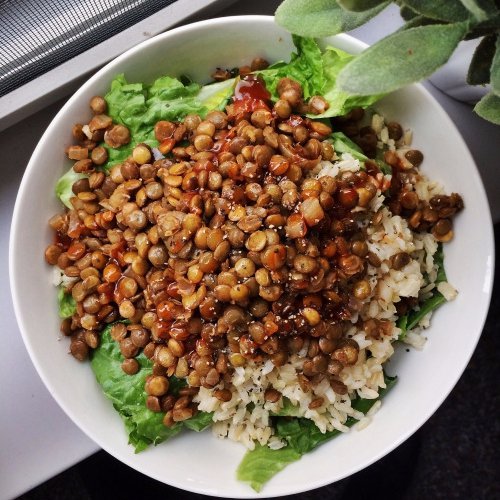 Protein: 16 grams per 1/2 cup, cooked
Protein: 16 grams per 1/2 cup, cooked
“Lentils are pulses, which are seeds of legumes that use nitrogen from the environment to make protein. They’re an excellent source of fiber (18 grams per 1/2 cup) and folate. Considered a starchy food, lentils contain "resistant starch," which is used by healthful bacteria in the colon to produce short-chain fatty acids and protect the colon.”
-Dawn Orsaeo, R.D., nutritionist in Orlando, FL
 Protein: 15 grams per cup
Protein: 15 grams per cup
“One cup of black beans offers not just 15 grams of protein but also 15 grams of fiber—nearly half a day's serving of fiber. The insoluble fiber helps keep your stools bulky and easy to pass (great to prevent constipation). Plus, it feeds the good bacteria in your gut that play a role in making serotonin, a hormone that keeps your mood positive and relaxed. Consider black beans a source of protein for more plant-based eating. Even if you aren't vegetarian, there's good reason to add black beans to the menu. The skin and coloring of black beans is full of phytonutrients, especially anthocyanins—powerful antioxidants that help maintain health of all our body's cells.”
-Rebecca Scritchfield, R.D.N., author of the upcoming book, Body Kindness
 Protein: 14 to 25 grams per 3 oz cooked
Protein: 14 to 25 grams per 3 oz cooked
“Shellfish—including crabs, lobster, shrimp, clams, mussels, oysters, and scallops—is a healthy alternative to red meat. It provides high-quality protein, omega-3 fatty acids for brain and heart health, zinc for immunity boosting, and vitamin B12 for keeping nerves healthy—and with fewer calories than red meat. Some shellfish have moderate amounts of dietary cholesterol, but the science now concludes that unhealthy types of saturated fat, not dietary cholesterol, are the main culprits in raising blood cholesterol.”
-Maggie Moon, R.D.N., author of The MIND Diet and owner of MindDietMeals.com
 Protein: 14 grams per thigh
Protein: 14 grams per thigh
“The dark meat of chicken and turkey is significantly higher in minerals including iron, zinc and selenium, as well as vitamins A, K, B vitamins and the amino acid taurine. In addition to its nutrient-dense profile, dark meats are an excellent source of protein for increasing muscle mass.”
-Jaime Schehr, N.D., R.D., nutritionist in New York City
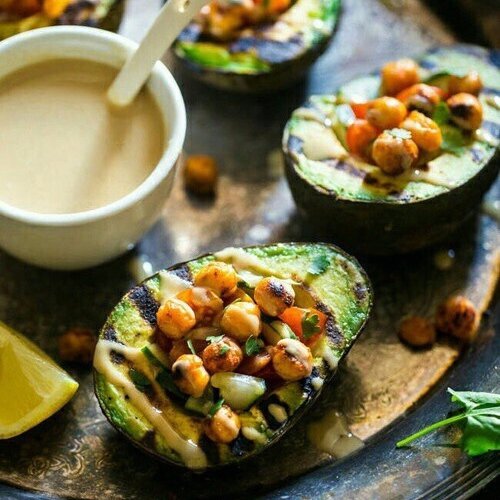 Protein: 14 grams per 1 cup, cooked
Protein: 14 grams per 1 cup, cooked
“Garbanzo beans, also known as chickpeas, are the world’s most popular legume. With a mild flavor and texture, their versatility makes them easy to eat, whether in hummus, chickpea salads, or pureed stews. Garbanzo beans are an excellent source of cholesterol-lowering fiber, and have more than a third of the day’s folate.”
-Maggie Moon, R.D.N., author of The MIND Diet and owner of MindDietMeals.com
 Protein: 13 grams per 1 cup
Protein: 13 grams per 1 cup
“A divine alternative to meat, kidney beans’ fiber keeps you full as it digests slowly, and provides you with a sizeable amount of iron, calcium, and even vitamin C. Plus, they’re cheap and easy to prepare in a Meatless Monday dish.”
-Monica Auslander, R.D., founder of Essence Nutrition in Miami
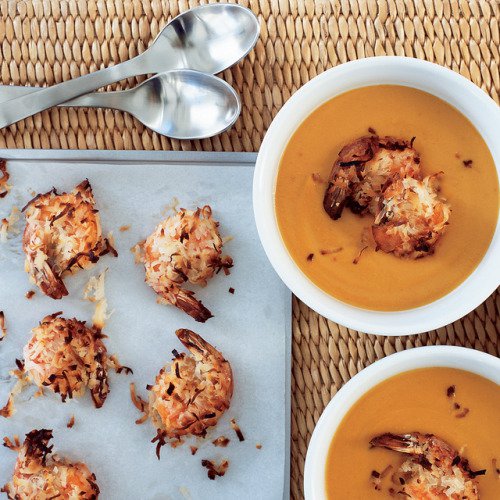 Protein: 12 grams per 3 ounces
Protein: 12 grams per 3 ounces
“Like most seafood, shrimp is relatively low in calories and high in protein, delivering 12 grams of protein with just 60 calories in 3 ounces of raw shrimp. A 3-ounce serving also contains about 20% of the Daily Value (DV) of phosphorus, more than 15% of the DV of vitamin B12 and small amounts of other vitamins and minerals. Shrimp is extremely low in saturated fat, with less than a tenth of a gram in three ounces.”
-Ashvini Mashru, R.D., owner of Wellness Nutrition Concepts in Malvern, PA
 Protein: 10 grams per 1 cooked cup
Protein: 10 grams per 1 cooked cup
“Kamut is an ancient variety of wheat that boasts significant fiber in addition to protein. The Dietary Guidelines for Americans recommends that men consume 34 grams of fiber, and one cup of cooked kamut will get you 20% of the way there. Fiber contributes to satiety and bowel regularity, among other functions. But be sure to look for 'whole kamut' on the label to get these benefits.”
-Emily Braaten, R.D.N., nutritionist in New York City
 Protein: 8 grams of protein per 1/2 cup cooked
Protein: 8 grams of protein per 1/2 cup cooked
“This wheat grain contains high amounts of fiber, which aids in healthy digestion, maintaining blood sugar levels, and lowering cholesterol. Because it’s a complex carb, farro breaks down in the body slowly, satiating hunger, and keeping energy levels up. Farro contains B vitamins, zinc and iron, niacin, magnesium and thiamine. It’s considered a terrific source of protein, providing approximately the same amount as most legumes or beans, and even more than many other whole grains.”
-Wendy Baruchowitz, certified integrative nutrition and health counselor and founder of Food That Cares, LLC
 Protein: 8 grams per cup
Protein: 8 grams per cup
“You'll get the same nutrients as in lower-fat milk, like calcium, vitamin D, and phosphorus (good for bone health and cardiovascular health). But recent studies have revealed there are also particular benefits of drinking whole milk, including preventing diabetes and obesity. Whole milk has short chain fatty acids (SFAs), one of the three biomarkers responsible for a nearly 50% reduced risk of developing diabetes. One SFA, butyrate, is helpful in keeping your colon healthy because it's a major source of energy for beneficial gut bacteria.”
-Rebecca Scritchfield, R.D.N., author of the upcoming book, Body Kindness
 Protein: 8 grams per 1 cup cooked
Protein: 8 grams per 1 cup cooked
“Quinoa is a perfect protein choice for vegetarian dishes. With a high protein content of almost 12% to 18%, it is the most protein-rich 'grain' (technically a pseudocereal) known. Plus, it contains all 9 essential amino acids, including lysine, making it a complete protein. Quinoa also reduces your chances of developing type 2 diabetes and can help you keep those glucose levels balanced if you already have diabetes. This is due to the fact that it’s rich in complex carbohydrates, or healthy carbohydrates, that slowly digest and keep you satiated for longer while keeping your blood sugar and appetite level.”
-Ashvini Mashru, R.D., owner of Wellness Nutrition Concepts in Malvern, PA
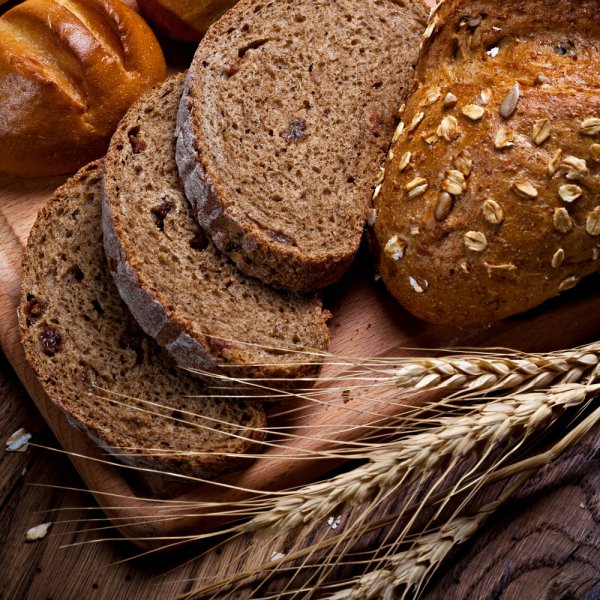 Protein: 8 grams per 2 slices
Protein: 8 grams per 2 slices
“In addition to having a surprising amount of protein, whole wheat bread also contains more fiber than white bread—about 6 grams in two slices—which helps your body digest food properly by regulating the transit time of food. That translates to reducing GI issues on both ends of the spectrum. Some indigestible fibers are 'prebiotic' food for the beneficial bacteria lining your colon, which, some research suggests, play a role in boosting immunity and helping to regulate mood.”
-Rebecca Scritchfield, R.D.N.
 Protein: 7 grams per 1 ounce
Protein: 7 grams per 1 ounce
“Mozzarella cheese contains 7.36g per 1-ounce serving, while provolone has 7.25g and parmesan offers 11g of protein per ounce. The average man needs around 56g of protein a day, so a healthy serving of cheese can provide you with plenty of protein in a small amount of food. Moreover, a 1-ounce serving of Swiss, cheddar, or mozzarella cheese will provide you with around 200 milligrams of calcium—that’s a fifth of your recommended dietary allowance (RDA) of calcium right there. Most cheeses have a plentiful supply of vitamins and probiotics, or 'good' bacteria, that can help regulate your gut flora. Maintaining a healthy intestinal environment is essential to good health, and can provide tons of benefits, ranging from digestive, to brain, to heart health.”
-Ashvini Mashru, R.D., owner of Wellness Nutrition Concepts in Malvern, PA
 Protein: 7 grams per 6 ounces
Protein: 7 grams per 6 ounces
“There are many benefits to this nutrient dense yogurt. Goat’s milk is highly nutritious, containing essential vitamins, minerals, and complete proteins. It’s easily digestible. It also provides beneficial bacteria and probiotics to help balance the levels of the ‘good’ and the ‘bad’ bacteria in the gut, which can support good digestion—especially important when you consider that the gut wall houses 70% of the cells that make up our immune system. Additionally, goat’s milk contains a decent amount of calcium (20% per 6 ounce serving), which is imperative to a healthy diet.”
-Wendy Baruchowitz, certified integrative nutrition and health counselor and founder of Food That Cares, LLC
 Protein: 6 grams per 1/4 cup (roughly 23 almonds)
Protein: 6 grams per 1/4 cup (roughly 23 almonds)
“Almonds are an excellent source of vitamin E, an antioxidant the body needs to fight oxidative damage. The damage is as commonplace as the kind that results from simply breaking down food to being exposed to pollution. Vitamin E also boosts the immune system and helps to keep blood vessels healthy by widening them and preventing clots from sticking to vessel walls. Almonds are widely studied for their beneficial role in heart health, weight management, diabetes, microbiome health, and satiety.”
-Maggie Moon, R.D.N., author of The MIND Diet and owner of MindDietMeals.com
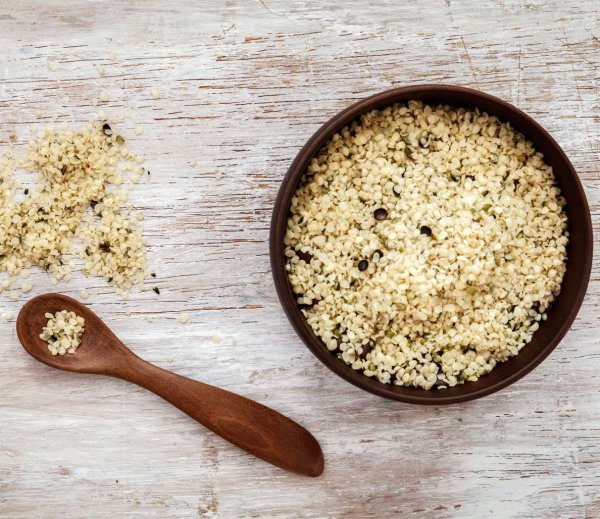 Protein: 6 grams per 2 tablespoons
Protein: 6 grams per 2 tablespoons
“Seeds are nutritional powerhouses; they carry an assortment of vitamins and minerals and are relatively high in protein and heart-healthy fat. Hulled hemp seeds in particular are high in polyunsaturated fat, which can lower ‘bad’ cholesterol. Try sprinkling some on your yogurt or in a smoothie.”
-Emily Braaten, R.D.N., nutritionist in New York City
 Protein: 6 grams per egg
Protein: 6 grams per egg
“Eggs are one of the most cost-effective sources of protein. They have a very high biological value, meaning that it is a very efficient source of protein, which you will find in both the egg yolks and the egg whites. Additionally, egg yolks are packed with additional nutrients such as vitamin A, choline, and B vitamins. Eggs are an extremely easy way to add additional veggies to your diet to truly optimize the vitamins and minerals on your plate!”
-Brigid Titgemeier, R.D.N., L.D. author of BeingBrigid.com
 Protein: 5 grams per 1 cup, raw
Protein: 5 grams per 1 cup, raw
“Mushrooms are high in fiber and one of the best non-meat sources of iron and Vitamin D, which most men are deficient in.”
-Monica Auslander, R.D., founder of Essence Nutrition in Miami
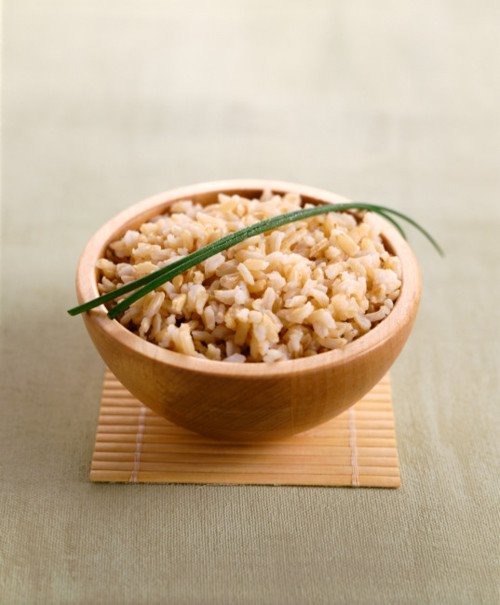 Protein: 5 grams per cup
Protein: 5 grams per cup
“Brown rice is a good source of magnesium, an important mineral in athlete recovery as well as cardiovascular exercise. Additionally, this grain is an excellent source of manganese, which helps produce energy from metabolism of protein and carbohydrates. For vegans, brown rice can be an important part of a complete protein when matched with another plant protein such as pea.”
-Jaime Schehr, N.D., R.D., nutritionist in New York City
 Protein: 5 grams per cup cooked
Protein: 5 grams per cup cooked
“Collards are bursting with nutrients, including vitamin K, which helps helps clot blood, immune-supporting vitamins A and C, fiber, calcium, riboflavin, B6, and iron. Collard greens are anti-inflammatory, and are also a potent detoxifying veggie.”
-Cynthia Sass, R.D., C.S.S.D., New York Yankees nutrition consultant and author of Slim Down Now
 Protein: 4 grams per 1 cooked cup
Protein: 4 grams per 1 cooked cup
“Potatoes provide several important nutrients, including vitamin C, B vitamins, iron, calcium, potassium and fiber. Cooked, cooled potatoes are also a source of a fat-burning carb called resistant starch. Like fiber, resistant starch fills you up but it doesn’t get digested and absorbed, and studies show that it triggers your body to burn more fat. Be sure to eat the skin, which provides extra fiber and antioxidants.”
-Cynthia Sass, R.D., C.S.S.D., New York Yankees nutrition consultant and author of Slim Down Now
 Protein: 4 grams per 1/4 cup (6 to 8 nuts)
Protein: 4 grams per 1/4 cup (6 to 8 nuts)
“A single ounce of Brazil nuts contains well above the daily value for selenium, a mineral that helps boost your immunity. In fact, the average Brazil nut contains about 70 micrograms of selenium, which is why I recommend this nut as a top choice. Having enough selenium in your body increases its production of cytokines, which help remove the flu virus.”
-Ashvini Mashru, R.D., owner of Wellness Nutrition Concepts in Malvern, PA
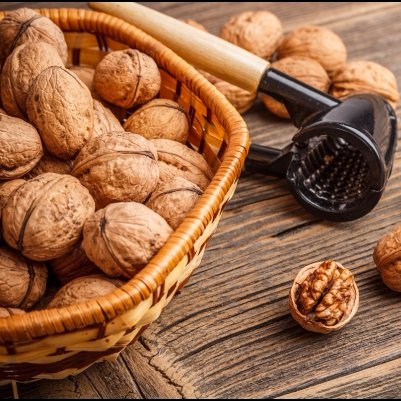 Protein: 4 grams per 1/4 cup (14 halves)
Protein: 4 grams per 1/4 cup (14 halves)
“Walnuts have the highest omega-3 fatty acid content of any nut. They're also the most nutrient dense, so you’re getting the most bang for your buck. Walnuts also pack a hefty amount of magnesium, fiber, and Vitamin B6.”
-Monica Auslander, R.D., founder of Essence Nutrition in Miami
 Protein: 4 grams per 2 tablespoons
Protein: 4 grams per 2 tablespoons
“Chia seeds are considered one of the most nutritious plant-based foods on the planet. They are rich in omega-3 fatty acids, fiber, antioxidants, and minerals, and aid in blood sugar regulation. All of these powerhouse ingredients help decrease body inflammation, lower cholesterol, and protect the body from free radicals, premature aging, and cancer. One serving of chia seeds contains critical minerals like calcium, phosphorous, and magnesium, which help prevent hypertension, maintaining a healthy weight and generating energy from nutrients.”
-Wendy Baruchowitz, certified integrative nutrition and health counselor and founder of Food That Cares, LLC
 Protein: 4 grams per 2 tablespoons
Protein: 4 grams per 2 tablespoons
“Flaxseeds are an excellent source of fiber and omega-3s, which can help lower inflammation. Flaxseeds may also help protect against cancer—they contain lignans, compounds that have antioxidant benefits, which may protect against hormone-related cancers.”
-Christy Brissette, R.D., president of 80 Twenty Nutrition
 Protein: 3.5 grams per 1/3 cup dry
Protein: 3.5 grams per 1/3 cup dry
“Oats are a naturally gluten-free whole grain that come in convenient instant ‘rolled’ or ‘old fashioned’ form for quick cooking, or steel cut pieces for a more toothsome bite. Oats have a kind of soluble fiber called beta-glucan that helps bind and remove cholesterol from the body. Research links whole grains, such as oats, to slower cognitive decline and reduced inflammation.”
-Maggie Moon, R.D.N., author of The MIND Diet and owner of MindDietMeals.com
Want more protein? There are loads of other foods that contain the nutrient. Find the whole list here: msn.com. Which one is your favorite?

A comparative analysis of yoga and gymnastics, outlining 20 key differences in approach, goals, and benefits, and how each can complement your fitness journey.

Make a bold, fashion-forward statement with these iconic looks that capture confidence and style.

Starting your day with intentional rituals can set the tone for a healthy and productive day. Discover 15 morning rituals inspired by the simplicity and beauty of nature.

Staying hydrated is crucial, especially when working out in open spaces. Learn 25 practical hydration tips to keep you energized and performing your best during your outdoor workouts.

Learn about the surprising connection between a good night's sleep and the health of your hair.

Learn how to incorporate peaches into your balanced diet in 23 different ways. From breakfast to dinner and snacks in between, enjoy this nutritious and tasty fruit throughout your day.

Staying motivated for indoor workouts can be tough. Discover these 25 tips and tricks to keep yourself inspired, on track, and committed to your fitness journey.

Raspberries are not just good for your taste buds; they are also great for your skin and hair. Here are 22 ways that incorporating raspberries into your beauty routine can work wonders.

Are you a coffee lover worried about its impact on your health? This blog post will guide you through 20 methods to enjoy your favorite drink while maintaining your wellness, including tips on choosing the right beans, brewing methods, and healthy add-ins.

Unearth the deep-seated connections between love and overall wellness, highlighting the health benefits of a loving relationship.
Sign up for our newsletter.